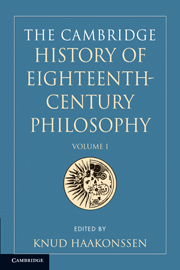Book contents
- Frontmatter
- CONTENTS
- Preface
- Methods of reference and abbreviations
- List of contributors
- I The Concept of Eighteenth-Century Philosophy
- 1 The History of Eighteenth-Century Philosophy: History or Philosophy?
- 2 Concepts of Philosophy
- 3 Schools and Movements
- 4 The Institutionalisation of Philosophy in Continental Europe
- 5 The Curriculum in Britain, Ireland, and the Colonies
- 6 Informal Networks
- II The Science of Human Nature
- Biobibliographical Appendix
- Bibliography
- References
3 - Schools and Movements
from I - The Concept of Eighteenth-Century Philosophy
Published online by Cambridge University Press: 28 March 2008
- Frontmatter
- CONTENTS
- Preface
- Methods of reference and abbreviations
- List of contributors
- I The Concept of Eighteenth-Century Philosophy
- 1 The History of Eighteenth-Century Philosophy: History or Philosophy?
- 2 Concepts of Philosophy
- 3 Schools and Movements
- 4 The Institutionalisation of Philosophy in Continental Europe
- 5 The Curriculum in Britain, Ireland, and the Colonies
- 6 Informal Networks
- II The Science of Human Nature
- Biobibliographical Appendix
- Bibliography
- References
Summary
The periodisation of the history of philosophy into centuries is no easy matter. A new departure in philosophy is often determined by recourse to something earlier, and not until it is viewed from a distance does any general pattern arise. Thus, an account of the philosophical thought in a previous era will nearly always be influenced by philosophical views characteristic of the century in which they are examined. Philosophers who in former days were praised to the skies are nowadays forgotten, whereas others who made only little impact on their own times are today regarded as being of major importance.
In this chapter, simple, broad lines will be drawn within eighteenth-century philosophy as seen from the close of the twentieth century. Therefore, it will not take into account how eighteenth-century thinkers rated themselves or one another; these thinkers will be regarded not from their own but from a contemporary point of view.
THE EIGHTEENTH-CENTURY EUROPEAN ENLIGHTENMENT
The period from 1700 to 1800 is usually termed the Age of Enlightenment. In the great encyclopedias – from Johann Heinrich Zedler’s Grosses vollständiges Universal-Lexikon (1732–50) to Denis Diderot and Jean le Rond d’Alembert’s famous Encyclopédie (1751–65) and the somewhat more modest first edition of the Encyclopædia Britannica (1771) – the knowledge of that age was communicated to the new intellectual elite, the upper-middle classes. Enlightenment, upbringing, education, and the transmission of knowledge were the key words. In his Considerations sur les mœurs de ce siècle (1749), the French writer Charles Pinot Duclos characterised the century as one of violent ferment, and to a dominant strand of the Enlightenment it was possible to direct and nurture this ferment by way of education.
- Type
- Chapter
- Information
- The Cambridge History of Eighteenth-Century Philosophy , pp. 45 - 68Publisher: Cambridge University PressPrint publication year: 2006
References
- 2
- Cited by



